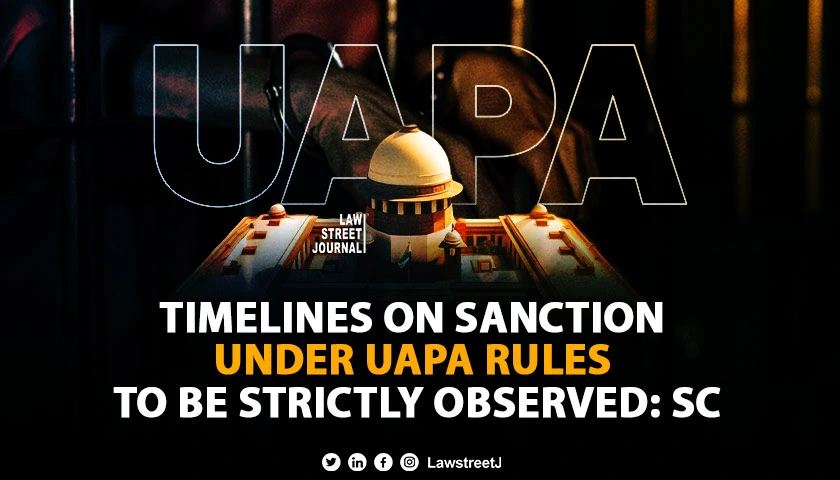NEW DELHI: The Supreme Court has said the validity of sanction under the Unlawful Activities (Prevention) Act should be challenged at the earliest instance available, before the Trial Court and if such a challenge is raised at an appellate stage it would be for the person raising the challenge to justify the reasons for bringing the same at a belated stage.
A bench of Justices C T Ravikumar and Sanjay Karol explained such reasons would have to be considered independently so as to ensure that there is no misuse of the right of challenge with the aim to stall or delay proceedings.
The court pointed out the rules provide a seven day period within which the concerned authority is to make its recommendation on the basis of materials gathered by the investigating officer and a further seven days period for the government to grant sanction for prosecution, having considered the report of the authority.
"These timelines are couched in mandatory language and, therefore, have to be strictly followed. This is keeping in view that UAPA being a penal legislation, strict construction must be accorded to it. Timelines imposed by way of statutory Rules are a way to keep a check on executive power which is a necessary position to protect the rights of accused persons. Independent review by both the authority recommending sanction and the authority granting sanction, are necessary aspects of compliance with Section 45 of the UAPA," the bench said.
The court rejected a contention by advocate Balaji Srinivasan, appearing for the appellant, Fuleshwar Gope, an associate of outlawed People’s Liberation Front of India, that the sanction was not in consonance with the statutory mandate as it was issued two years and 11 months after the incident and two years and six months after the letter of May 12, 2017.
He claimed requirement of ‘independent review’ in according sanction was not complied with.
The counsel also said the proviso to Section 22A of the UAPA exempted a person who is not in charge of and responsible for the affairs of the company, from prosecution.
The appellant allegedly formed a company M/s Shiv Shakti Samridhi Infra Pvt Ltd, in the nature of a partnership, for the purpose of directly or indirectly collecting funds from legitimate or illegitimate sources for the use of activities of the outlawed organisation. He was arrested by the NIA on July 13, 2020.
An was FIR lodged in Jharkhand on November 10, 2016 when PLFI chief Dinesh Gope alias Kuldeep Yadav alias Banku allegedly brought Rs.25.83 lakhs of demonetised currency to an SBI branch.
The court, however, said whether or not the exemption under Section 22A applies is a matter to be established by the way of evidence for the person claiming such exemption has to demonstrate that either he was not in charge of the affairs of the company which has allegedly committed the offence, or that he had made reasonable efforts to prevent the commission of the offence. This, once again, is a matter for the Trial Court to consider and not for this Court to decide at this stage, keeping in view that the trial is underway and proceeded substantially, the bench said.
Referring to Section 223 of the CrPC, the bench said as the provision itself mandates that no finding, sanction or order by a court of competent jurisdiction becomes invalid unless it is so that a failure of justice has in fact been occasioned because of any error, omission or irregularity in the charge including in misjoinder of charge, obviously, the burden is on the accused to show that in fact a failure of justice has been occasioned.
It also said, "An order passed by an administrative authority is not to be tested by way of judicial review on the same anvil as a judicial or quasi-judicial order. While it is imperative for the latter to record reasons for arriving at a particular decision, for the former it is sufficient to show that the authority passing such order applied its mind to the relevant facts and materials."
The court dismissed the petition against the Jharkhand High Court's order rejecting his plea and granted him liberty to raise the issue before the Trial Judge, who would decide it promptly at the appropriate stage.















